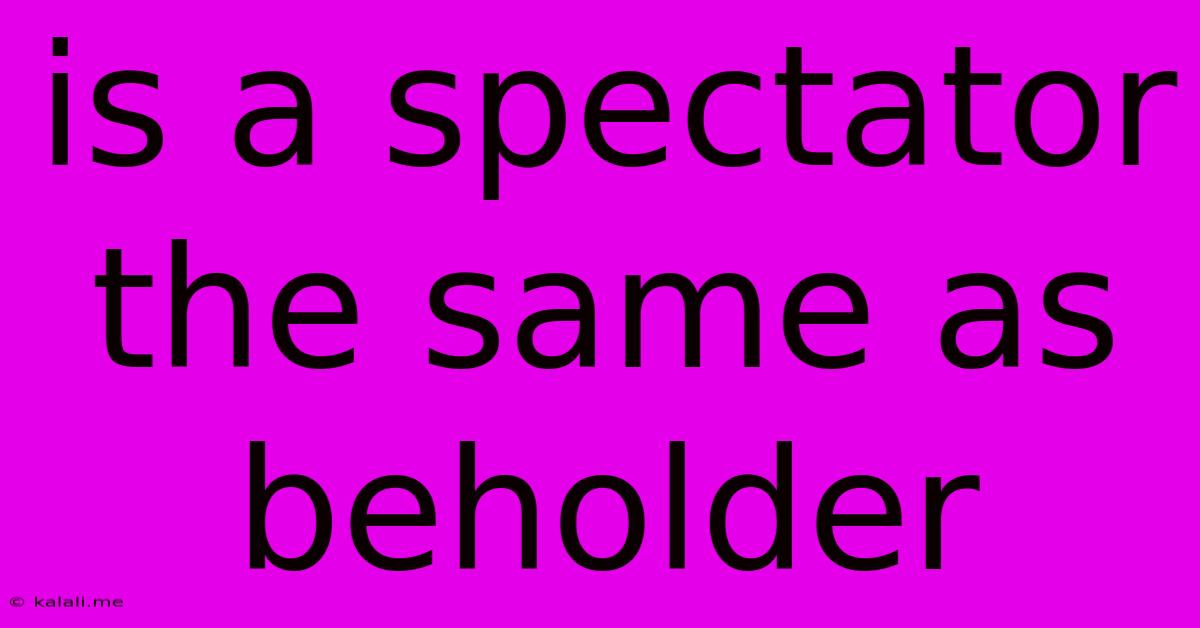Is A Spectator The Same As Beholder
Kalali
Jun 02, 2025 · 3 min read

Table of Contents
Is a Spectator the Same as a Beholder? Unpacking the Nuances of Observation
While the words "spectator" and "beholder" might seem interchangeable at first glance, a closer look reveals subtle yet significant differences in their connotations and usage. This article delves into the nuances of each term, exploring their etymological roots and examining the contexts where one is more appropriate than the other. Understanding these distinctions can significantly enhance your writing and communication, enabling you to choose the word that most precisely reflects your intended meaning.
What Does "Spectator" Mean?
A spectator is someone who is present at an event or performance as a passive observer. The word originates from the Latin "spectare," meaning "to look at" or "to watch." Spectators are typically involved in large-scale events, like sporting events, theatrical performances, or public demonstrations. Their role is primarily observational; they are there to witness something unfold, often without direct participation. Think of the crowd at a football game – they are spectators.
Key Characteristics of a Spectator:
- Passivity: Spectators are generally not actively involved in the event they are observing.
- Large-scale events: The term is often associated with public gatherings.
- Observation-focused: Their primary purpose is to watch and witness.
What Does "Beholder" Mean?
A beholder, on the other hand, is someone who sees or observes something, often with a more personal or subjective response. The word carries a stronger sense of individual perception and emotional engagement. Unlike a spectator, a beholder might be involved in a smaller-scale event or even observing something from a distance, such as a work of art or a natural landscape. The emphasis is on the experience of seeing and the impact of that sight on the beholder.
Key Characteristics of a Beholder:
- Active engagement: Beholders are more likely to interpret and react emotionally to what they see.
- Subjective experience: Their perspective and feelings are central to the observation.
- Broader context: The term can encompass solitary observation as well as more public situations.
The Crucial Distinction: Active vs. Passive Observation
The core difference lies in the degree of active engagement. A spectator passively watches; a beholder actively observes, interprets, and often reacts emotionally. A spectator at a concert simply hears the music; a beholder might be deeply moved by the music's emotional resonance.
Think of a painting: Many people might be spectators at an art exhibition, simply looking at the painting. However, the person who stands before it for a longer time, contemplating its brushstrokes and meaning, is a beholder. They are actively engaged in an individual, subjective experience.
When to Use Each Word
Choosing between "spectator" and "beholder" depends heavily on the context and the nuance you want to convey. Use "spectator" when referring to:
- Large crowds at public events.
- Passive observation of an event.
- A neutral, detached observation.
Use "beholder" when referring to:
- An individual's unique perspective and emotional response.
- Solitary observation or contemplation.
- Active engagement with the observed subject.
In conclusion, while both words relate to observation, "spectator" denotes passive observation within a larger group, while "beholder" suggests a more active, personal, and often emotional engagement with what is seen. Choosing the right word significantly impacts the precision and impact of your writing.
Latest Posts
Latest Posts
-
Should You Add A Compressor To Every Track
Jun 03, 2025
-
Check Ipad Version By Serial Number
Jun 03, 2025
-
What Film Cameras Have The Exposure Number
Jun 03, 2025
-
Catholic Church Joseph Holier Than John The Baptist
Jun 03, 2025
-
How Do You Spell Japanese In Japanese
Jun 03, 2025
Related Post
Thank you for visiting our website which covers about Is A Spectator The Same As Beholder . We hope the information provided has been useful to you. Feel free to contact us if you have any questions or need further assistance. See you next time and don't miss to bookmark.